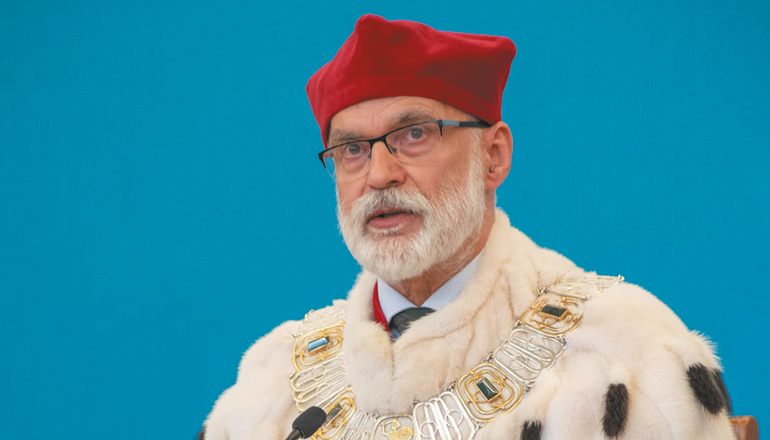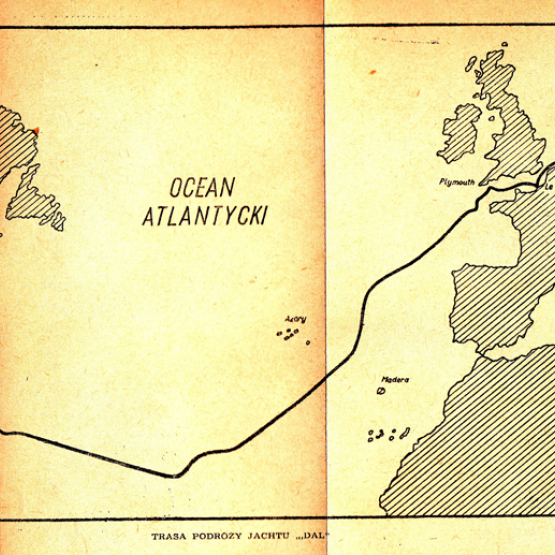
SOLID FOUNDATIONS FOR A SUSTAINABLE DEVELOPMENT OF THE UNIVERSITY
Dear Guests, Dear Ladies and Gentlemen,
Celebrating the 113th anniversary of the first meeting of the Senate of our university, I have the privilege to share with you, our academic community and invited guests, a reflection and experiences from recent months. The reflection and experiences are related to hard work on the new legal and organisational order at SGH, which we create in connection with the Law on Science and Higher Education introduced in September.
First of all, I would like to emphasise the environmental and social character of the indicated work, broadly involving all groups of the academic community. Dozens of meetings and talks were conducted with representatives of collegiate bodies, the Senate statutory committee, students and doctoral students, individually with employees, as well as in teams during an open consultation meeting in this assembly hall.
The consultations - which must be said - were not limited to direct conversations, because the draft statute was made available on the website for all employees. The effect of the aforementioned decision was obtaining several dozen important votes in the discussion. Thank you very much for all these opinions, comments, conversations and meetings. They helped prepare the final shape of the project, which I shall submit at the nearest May meeting of the SGH Senate.
Ladies and Gentlemen, I must underline that the draft statute was created on the basis of SGH basic legal act currently in force, and thus respecting our tradition and legislative solutions created over the last three decades. The changes we have proposed result from the need to comply with the applicable law.
At the same time, we are taking advantage of the opportunities brought by new statutory regulations, creating a statute that provides a solid basis for the sustainable development of SGH and the implementation of the university's strategy currently being developed for 2020-2030.
In the new statute, we appoint scientific councils for disciplines in which the SGH community conducts research and promotes scientists. These new bodies - resulting from statutory changes - will provide a possibility to merge specialists from five colleges into one vote, important in the national and international research arena, in each of the disciplines run by SGH.
At the same time, which I would like to emphasise, caring for SGH traditions and values resulting from the cooperation of scientists, we maintain collegia - as environmental associations, corporations of scientists within each collegium, recognising the value of rich relationships resulting from the cooperation between collegia.
The collegia, as so far, will be headed by the deans. The act provides the rector with the competences to appoint persons managing the collegia. Respecting our tradition and values, however, I intend to give up some of these rights and submit my candidates to the opinion of all employees associated in each collegium. After the adoption of the statute, I intend to use this solution in five months’ time, putting new statutory regulations into practice.
The second major change is the establishment of one, strong in its substantive foundations, SGH doctoral school. The university senate has already adopted the school regulations and soon we will start the first recruitment for studies combining the best achievements and experience of five colleges in individual disciplines. This is a new quality that will make us stand out in the education of future academic staff for higher education and the research and development activity of enterprises and public institutions.
Ladies and Gentlemen, the establishment of a university council will also be a very important change. This is another new body that performs management functions and supports the rector in managing the university. We take the indicated task very seriously. We make the most of the opportunity to establish an authority that will very realistically support our efforts to develop the university. The SGH Senate has already adopted the rules for establishing the first university council, which are identical to the project of the new statute.
Unlike many other universities, we design the council in the maximum number of members - provided for by the Act - and with greater involvement of external experts than required by the Act. We also accept important quality criteria for its establishment. And so: in the council we provide seats for experts proposed by the SGH Partner Club, i.e. by companies closely cooperating with our university. It is worth mentioning at this point that we celebrated the 20th anniversary of this excellent cooperation not so long ago.
Moreover, the council will include a representative of an organisation of representative employers on a national scale, i.e. members of the Social Dialogue Council. In addition, we count on further development of cooperation with the local community and the implementation of the university's third mission. Therefore, we have provided for a seat for a representative of the Council of the Capital City of Warsaw in the composition of the SGH Council. The relations with graduates are very important to us, which is why we literally provide a place for a student of our university. At the same time, we hope that the council will include many other graduates of our Alma Mater. We also count on the support of our academic community in managing the university – we intend the composition of the council to be expanded with seats for: a representative of the SGH employees indicated in general elections, a representative of the SGH Senate, a representative of students, as well as - respecting the experience of managing our university - for one former rector, a vice rector or a dean of a collegium. I deeply believe that this new body - the university council - will constitute a strong support in the university mission accomplishment and in fulfilling the currently planned development strategy.
Ladies and gentlemen! Before the commencement of our work on designing the new statute, the university senate unanimously adopted the SGH mission in the new shape as well as guidelines for constructing the vision and the aforementioned development strategy. These assumptions - like the project of the statute - have been prepared in the course of extensive environmental consultations conducted among members of our community and among our economic partners. Soon, after adopting the new statute, we will resume work on the final form of the 2020-2030 strategy. While shaping it, we are guided by the conviction that SGH has the ambition to be the leader in the field of science and economic education and wants to integrate the entire academic community around the indicated strategy and undertake bold initiatives.
In our vision, we are guided by the conviction that SGH Warsaw School of Economics is an elite economic university, academic in nature, setting high demands on its community, educating at the highest level and that it should combine the features of an economic university and a practical business school, whereas the characteristic features of the university include conducting interdisciplinary research, also international, and finally - that SGH is a university oriented at the needs of an open economy, cooperating with business practice, public administration and social organisations, cooperating and conducting a constant dialogue with key stakeholders, being a leader of initiatives integrating economic environments in the country and abroad, and first of all, being an open university that supports new social ideas.
Let me remind you that we construct our strategy around the key values of SGH, which are: integration of the academic community, scientific excellence and leadership in economic education, openness, academic entrepreneurship and organisational efficiency. This is also manifested by the Code of Ethics for SGH Researchers adopted by the Senate. It is an element of building the social responsibility of our university and support in everyday work.
Ladies and Gentlemen, the time which has passed since the previous SGH holiday was a period of particularly hard work. The achievements of our community during this period were significant. The university authorities both supported the initiatives of the SGH community and suggested their own proposals. I encourage all those who care about the well-being of SGH Warsaw School of Economics to join us so that we could create a university meeting our ambitions, pride and expectations.
I wish you such a university on the Day of SGH Warsaw School of Economics.
dr hab. Marek Rocki, prof. SGH, High Magnificence Rector of SGH Warsaw School of Economics
…we use opportunities brought by new statutory regulations, developing the statute which provides a solid basis for the sustainable development of SGH and the implementation of the university’s strategy, currently developed, for the years 2020–2030.
Prof. Marek Rocki, the Rector of SGH Warsaw School of Economics




